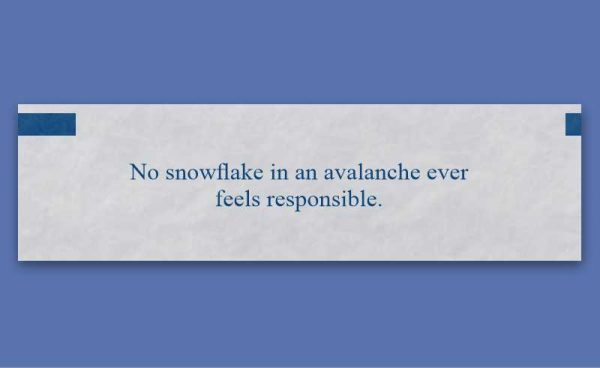Fortune Cookie Friday: Potential of a Snowflake
Today’s fortune is brought to us by 1960s Polish poet Stanislaw Jerzy Lec. Many poets and writers use metaphors, so it isn’t surprising to find many fortunes are metaphors. Interestingly, many fortunes, proverbs, etc., are also philosophical or have a psychological aspect.

Think of a single snowflake high up on a rocky peak. A gust of wind catches it and pushes it over. It joins the other flakes around it, pulled by gravity. Before you know it, an avalanche of snow is careening down a mountainside.
We can interpret our fortune in two ways:
It can convey that many small things can add up to something much larger and more significant. Each snowflake is tiny and insignificant, but when they all come together, those flakes can create something powerful and destructive.
Our fortune can also be interpreted as a metaphor for individual responsibility in a group setting. Each snowflake may not be responsible for causing an avalanche, but it is still a part of the event.
American writer James Geary stated in his interview with Dr. Larry Barsh that this fortune is “a pretty perceptive comment on groupthink and the power of mass psychology or buying into mass psychology.”
Groupthink is a pattern of thought characterized by self-deception, forced manufacture of consent, and conformity to group values and ethics. It’s similar to mob mentality, in which a larger group influences individuals.

Why do we find ourselves influenced by the actions of a group or crowd? Why do we feel compelled to follow along without considering the consequences? This may partially be because the presence of others provides a powerful signal of safety and support. This behavior is called social facilitation; we are better at tasks when we are in the company of others compared to when alone. This behavior has been around for a while and is found in many other animals.
Sometimes the group encourages us with appeal, such as when they convince us that the action will be fun or make us feel better. But they can also encourage us by intimidation. When it is us versus a horde of people, fear can cause us to do strange things.
We find mob mentality and groupthink in politics, fashion, culture, and even during the pandemic. Mainly because we want to be a part of something, fit in, and be accepted, or we don’t want to lose face.
We don’t have to walk away with a negative connotation from our fortune today. Instead of looking at how we aren’t responsible for wrong actions because everyone else was involved or going along with whatever popular notion we see to appease a group, we can see a positive aspect of this metaphor.
The feeling of responsibility doesn’t have to be about accepting blame but owning our power to influence. We should recognize that we, as an individual, have a lot of potential to do great things.

No one is insignificant. The tiniest pebble can make ripples in the water, and every snowflake can be the beginning of a snowman. All the seemingly small things we do can ultimately influence others, sometimes significantly.
We can smile at others, tip generously, mentor or teach, hold a door open for someone, stand up for others, volunteer, donate items, or be respectful and courteous. We can do these things not because we have to but because we want to, and we can do them anonymously. Kind actions can brighten someone else’s day, and that good feeling can pass from them to another person.
We can all make a difference in the world. We need to choose good over evil. Instead of destruction, we can cause creation, production, restoration, renewal, and community. That is something worth being a part of.




